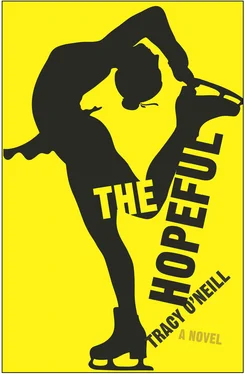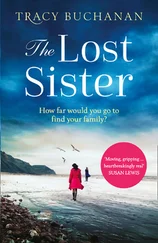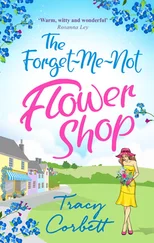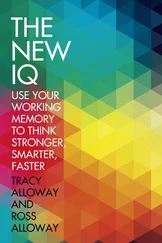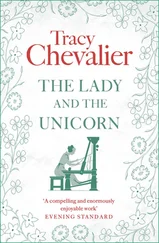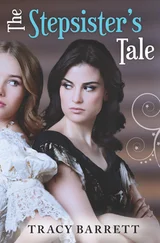“We don’t have problems,” a man said. “We have solutions. That’s what unity is: our solution. And calling it a problem isn’t very supportive.”
“Maybe now would be a good time to discuss constructive dialogue,” the group leader said.
“Nigger!” spat a woman, rocking in her seat. Well fine. Better to be hated than another of the anonymous.
“Grace, we don’t use the N word, but I understand your frustration,” the group leader said. He turned to me. “Miss, perhaps it would be best if you left. We encourage you to consider attending another open meeting, though, when you can join us with a more mature attitude.”
“I don’t want to join you,” I said. “I never did.”
“We won’t miss you,” Grace said.
It seemed that everything was in my way. Difficulties were crowding around, and the only way to keep them from completely hemming me in was to take my mind off everything, to be just a body. I looked down at the hallway floor. When I saw that it was waxed, I took off my shoes, then ran and threw myself gliding inches, foot, feet. I felt corporeal again, didn’t think a thing. Frictionless, flying, sliding: this was self-actuality.
“And now you can’t even keep shoes on!” Mo shot for decibels with his footsteps when he came out into the hall. “Because of you I can never show my face here again.”
“So go to another meeting,” I said.
“This was the one I liked. This is the one that worked.” He didn’t wait for me as he started walking to the car.
I followed him and we drove home silently, but that we had nothing to say didn’t bother me anymore. Everyone else, I’d come to realize, was exactly that: everyone else.
At home, I climbed the stairs to my bedroom. As a little girl, I thought that the creaks were colonial ghosts, closing doors. Sometimes I would run up the stairs humming and covering my eyes. “You’ll skin a knee,” my mother would say, and when an explanation was demanded, I couldn’t provide one. The fear was like weather. It had begun shining onto me, and all I could do was block out my senses. “Are you afraid they’ll steal you away? Are you afraid they’ll kill you?” she asked when I finally admitted it was ghosts. “If you’ve never seen them, how do you know it’s you they’re after?” But no matter how stupid it sounded then, the next time I heard the creak, I still felt my hands go to my eyes, my feet quicken.
Now I knew there was something to fear, and what haunted this house wasn’t anything dead but the question of how to live my life. There wouldn’t be more speed from John Doe, without AA, and I still had five pounds to go. I’d put myself between a rock and a hard place, hooked on the amphetamine plan without a plan to get amphetamines. The only option was to continue my conditioning as I groped for sources. I’d have to wean myself down to two pills a day in case the search took time. It was slower doing it this way than with the drugs, but I wouldn’t make detrimental gains in the meanwhile.
Time was another thing, though. Time was always a detrimental gain. I needed to get back on the ice before I turned eighteen so that I’d have four years to regain my skills, pass the two skating tests left to become a senior lady, and compete in the Olympic qualifier at twenty-two. I only had a month and a half left until my birthday. So I pedaled and pedaled, watching Michelle Kwan’s 1998 National Championships long program performance. Skated to “Lyra Angelica,” it was choreographed for her with one word in mind: joy. Her choreographer, Lori Nichol, was paying homage to Janet Lynn, and the message of hope she communicated in her prayer-like skating. That season, Kwan had suffered a stress fracture to her toe. She was in a cast in November and at the Nationals in January. As I watched the video, I thought: she should be afraid. She has lost her national title. She has lost her world title. But in the video she looks anything but afraid. She is exactly what she hadn’t been the year before, performing with the illusion of effortlessness where she’d been pensive, graceful where she’d been tense. Her jumps are airy. She does what no one else does in the competition, a spin combination in both directions, that of a left-handed and right-handed skater; it is as though she is saying the scope of her ability is all-encapsulating. Towards the end, as she lands her triple Lutz, a quick burst of excitement shows. She rounds a bend into a spiral, and there it is on her face, exactly what had been asked of her: joy. Her final jump is the one most painful to perform on her injured foot: the triple toe loop. She lands easily, and as she does, arches her back to look skyward, thankful. She looks so happy, unencumbered, basking in the yield of hope.
I watched the video and cried. Then I watched it again. My life wasn’t over yet.
Since my college exams were over and the race for the new communist candidate seemed lost before the voting even started, Mark was returning to Dartmouth. He came to say goodbye a few days after my last AA meeting. He hadn’t been over much since the fight.
“Knock knock,” he said, pushing the door open.
“Who’s there?” I asked, stopping my push on the stationary bike.
“Orange,” he said. “Agent Orange.”
“Didn’t anyone tell you Charlie’s been defeated?”
“That’s alright. I’m here for you.”
“I’m fresh out of white flags,” I said. “So don’t expect me to go down without a fight.”
“With you,” Mark said, “I always expect a fight.”
I was heart-jumpy, and I didn’t know if it was him or the amphetamines. “A communist and a realist!” I said. “A virtuoso!”
“I taught you that word.”
“You didn’t, but you made me remember it.” I was sweating, and wondered if I smelled like feet. “So, back to the Ivy League?”
“Back to the Ivy League.”
“And you came to say goodbye?”
“I came to say goodbye.”
“Was that it?”
“No, that wasn’t it.”
I looked up at him. My crotch felt bruised from the bicycle seat, and I could feel the pulse in my neck.
“I came to say that that stuff will rot your teeth. How many days have you been awake? You look like someone beat you up and left you in an alley. You won’t get away with it.”
I guess Mark knew I was doing something illegal because he’d gone to college. There were people who popped pills to memorize the chronology of Chinese dynasties. I repeated the last part—“It?”—because there is innocence in questions.
“And also that I hate it when you play dumb,” he said. I wasn’t as good of a liar as I’d thought. “I care about you too much to see you do this to yourself.”
“Then don’t look.”
“Ali, you’re going to hurt yourself. You’re going to hurt everyone around you. I don’t know why you’re doing this, but whatever it is, it’s not worth it.”
“How would you know?”
“Because I know that you’re worth more than a high.”
“Anything else?”
“And that I like everything about you except who you insist you are.”
“Insist,” I said.
“Insist,” he said. “I’ve never met someone so hell-bent on being a world historical figure, and my boss is the communist presidential candidate.”
“We both know that’s not true anymore.”
“Is it only ever about winning to you?”
“If I only wanted to win,” I said. “I would play solitary chess.”
“You’ll give yourself heart palpitations.”
“Well at least it will be my fault.”
“Are you trying to kill yourself? There are people who love you.”
“I’m trying to live myself!”
“You belong in a straitjacket. I’m serious. Padded walls.”
Читать дальше
